
As life progressed into the 70’s the subject of exercise perhaps started to fade slightly from the forefront of politicization. The era of Vietnam brought more protests against military involvements, and potentially de-popularized the notion that all youth must be maintained in Army-ready fitness. But, Madison Avenue would continue to pick up the slack where government campaigns let off, and the image of a slim, trim you would still be heavily promoted as an ideal – particularly where the female population was concerned. Thus, it seemed the emphasis shifted by gender – no longer concerned with supporting troop lines, but merely with making America aesthetically pleasing to the eye – and turning a quick profit in the process. And the animated cartoon, in its never-ending quest for thinner pencil lines, went marching on.
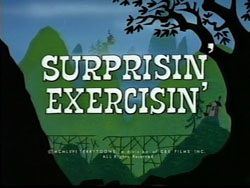 Surprisin’ Exercisin’ (Terrytoons/CBS, Possible Possum, July 1968, Cosmo Anzilotti, dir.) – Possible Possum and Macon Mouse bemoan their lack of food money, and the prospect that if something doesn’t change soon, they’ll be left with no alternative but to eat roast empty piggy bank. Billy Bear, however, arrives with good news. He’s landed a job with the park rangers to pose for photos for the tourists – provided he can take off some of his stomach blubber to make himself more photogenic. He’s received the loan of a box of exercise equipment for such purpose. However, he doesn’t reckon on the effect of its 1,200 pounds of weight upon the floorboards of the group’s abandoned railroad station home, and lands himself in the cellar after taking one step inside. “If you;’re not more careful, you’ll be reduced, all right”, says Possible, “to a hospital case, that is.”
Surprisin’ Exercisin’ (Terrytoons/CBS, Possible Possum, July 1968, Cosmo Anzilotti, dir.) – Possible Possum and Macon Mouse bemoan their lack of food money, and the prospect that if something doesn’t change soon, they’ll be left with no alternative but to eat roast empty piggy bank. Billy Bear, however, arrives with good news. He’s landed a job with the park rangers to pose for photos for the tourists – provided he can take off some of his stomach blubber to make himself more photogenic. He’s received the loan of a box of exercise equipment for such purpose. However, he doesn’t reckon on the effect of its 1,200 pounds of weight upon the floorboards of the group’s abandoned railroad station home, and lands himself in the cellar after taking one step inside. “If you;’re not more careful, you’ll be reduced, all right”, says Possible, “to a hospital case, that is.”
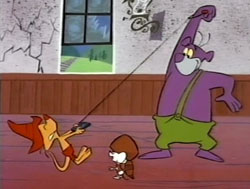 Spreading out the equipment to avoid making any more craters in the flooring, the group gets down to the business of Billy’s belly. The first item of interest is a rowing machine. Billy settles into the seat, and commences powerful rowing strokes. In a return to a standard cliche gag, Billy’s momentum causes the machine to slide along the floor, pick up speed, and crash through a wall, descending a riverbank into the water. The machine rests on the bottom of the creek mud, with Billy’s head just above the surface. “It rows pretty good, but it don’t stay on top of the water so well”, observes Billy.
Spreading out the equipment to avoid making any more craters in the flooring, the group gets down to the business of Billy’s belly. The first item of interest is a rowing machine. Billy settles into the seat, and commences powerful rowing strokes. In a return to a standard cliche gag, Billy’s momentum causes the machine to slide along the floor, pick up speed, and crash through a wall, descending a riverbank into the water. The machine rests on the bottom of the creek mud, with Billy’s head just above the surface. “It rows pretty good, but it don’t stay on top of the water so well”, observes Billy.
Possible next unpacks a spring-coil arm exerciser, which he explains to Macon Mouse is for attachment to the wall. He attempts to demonstrate what it does by having Billy pyll on the handle while he holds the mounting post. But Billy’s strong pull launches Possible upwards, and through yet another hole, this time in the roof. With a blackened eye, Possible calls back through the hole, “Maybe we should’ve attached it to the wall.” By next scene, this is precisely what they have done, installing a pair of hand pulls. Billy works vigorously with alternating tugs of the handles, then decides to show his strength by pulling “two at a time”. The pull rips out the section of wall the apparatus is mounted to, bashes Billy in the head, flings him out the front door, then pulls him back again for another crash. “Do you think you’re losin’ any weight?”, asks Macon. All Billy thinks he’s losing is a desire for that job.
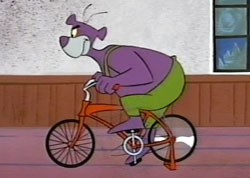 Next, a stationary bicycle. The old gag revisited again, as the rear stand vibrates out of place like a kick-stand removed. Billy sails out the station rear door, up a hill, back down again in reverse, into the station, and takes out another wall. Possible is noticing their home is beginning to look thinner than the bear himself. Possible installs one more device from the roof rafters – a chinning bar. Billy’s weight, reduced or no, is still an overwhelming factor here, and Poss quickly realizes he has made a mistake, as the rafters begin to groan. He and Macon Mouse abandon station, as the roof caves in under the bear’s weight, and all four walls collapse in one by one, as if watching the fall of a house of cards.
Next, a stationary bicycle. The old gag revisited again, as the rear stand vibrates out of place like a kick-stand removed. Billy sails out the station rear door, up a hill, back down again in reverse, into the station, and takes out another wall. Possible is noticing their home is beginning to look thinner than the bear himself. Possible installs one more device from the roof rafters – a chinning bar. Billy’s weight, reduced or no, is still an overwhelming factor here, and Poss quickly realizes he has made a mistake, as the rafters begin to groan. He and Macon Mouse abandon station, as the roof caves in under the bear’s weight, and all four walls collapse in one by one, as if watching the fall of a house of cards.
Thirty pounds lighter, Billy returns accompanied by his friends to claim the tourist job. However, he has to be assisted by Poss and Macon every step of the way, as he is severely bandaged, in casts, and walking on crutches. One look, and the park ranger boots Billy out the door, declaring him to be a total wreck. The good news is that Possible and Macon get hired to do posing for the tourists in place of Billy. The bad news is that Poss and Macon will share their food money with Billy – only after he finishes rebuilding their home.
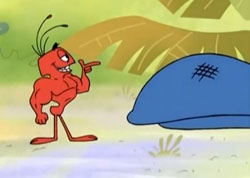 Don’t Hustle an Ant With Muscle (DePatie-Freleng/UA, The Ant and the Aardvark, 12/27/70 – Art Davis, dir.) A bit routine for the series, with less than the usual number of expected surprises. In his never-ending race to escape becomins an aardvark’s lunch, Ant enter the bathroom window of a residential home, where he encounters a bottle of vitamin pills. Tuckered out from all the running, he tries one to see if they work on ants. The pill makes him feel so good, he decides to see if 10 will make him ten times as strong. Within moments, Ant has the physique of a miniature body-builder. He leaps outside right past Aardvark. Aardvark turns on his patented vacuum-suction nose, and gets Ant inside. But the buffed insect takes control of the situation, dragging Aardvark around bodily by his nose, pulling it through a hole in the base of a tree truck, then jumping out of the elongated schnozzola, allowing ot to snap back at Aardvark like a rubber band, compressing as if retractable into the features of Aardvark’s face. Aardvark tries to deliver a crushing fist blow on Ant, only to find it has no effect, reverberating with a clang as if Aardvark had struck an object of solid steel, leaving Aardvark in significant pain. Aardvark determines to make Ant “a member of the club” by swinging at him with one, but the club again is stopped cold and vibrates from the collision with the immovable object, the vibrations carrying Aardvark himself off a cliff. Aardvark crawls his way back to the summit, and threatens Ant at his anthill that he’s coming in. No need to, as Ant comes out, burrowing under Aardvark to pick him up and dropping him off the cliff again.
Don’t Hustle an Ant With Muscle (DePatie-Freleng/UA, The Ant and the Aardvark, 12/27/70 – Art Davis, dir.) A bit routine for the series, with less than the usual number of expected surprises. In his never-ending race to escape becomins an aardvark’s lunch, Ant enter the bathroom window of a residential home, where he encounters a bottle of vitamin pills. Tuckered out from all the running, he tries one to see if they work on ants. The pill makes him feel so good, he decides to see if 10 will make him ten times as strong. Within moments, Ant has the physique of a miniature body-builder. He leaps outside right past Aardvark. Aardvark turns on his patented vacuum-suction nose, and gets Ant inside. But the buffed insect takes control of the situation, dragging Aardvark around bodily by his nose, pulling it through a hole in the base of a tree truck, then jumping out of the elongated schnozzola, allowing ot to snap back at Aardvark like a rubber band, compressing as if retractable into the features of Aardvark’s face. Aardvark tries to deliver a crushing fist blow on Ant, only to find it has no effect, reverberating with a clang as if Aardvark had struck an object of solid steel, leaving Aardvark in significant pain. Aardvark determines to make Ant “a member of the club” by swinging at him with one, but the club again is stopped cold and vibrates from the collision with the immovable object, the vibrations carrying Aardvark himself off a cliff. Aardvark crawls his way back to the summit, and threatens Ant at his anthill that he’s coming in. No need to, as Ant comes out, burrowing under Aardvark to pick him up and dropping him off the cliff again.
Aardvark begins to realize he’s dealing with no ordinary ant, but can’t figure out Ant’s secret. Ant meanwhile has managed to cart the bottle of pills home, and periodically takes an additional dose to keep in top shape. When Aardvark sticks his nose where it doesn’t belong again, Ant uses his strength to set a booby trap. He pushes into position below Aardvark’s nose a heavy box of magnetized ball bearings. Aardvark inhales the bearings one by ne, until the whole box weighs heavily in his rear end. Not exactly a light lunch. Aardvark starts attracting anything metal, and Ant rolls under him in his subterranean tunnels a black-ball time bomb. The ball attracts itself to Aardvark’s rear end through the topsoil, appearing on the surface as only a ticking bulge in the Earth as it rolls along in the underground tunnels. Aardvark helplessly tries to evade it, and is finaly forced to leap off a cliff into a lake. The ball simply follows, finding its way out of a hole in the cliffside, and blows the Aardvark and the lake water shy high.
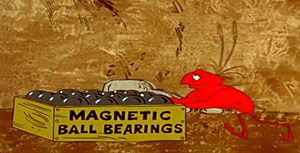 Upon his return to the anthill, Aardvark is shocked to hear Ant issue commands to him, telling Aardvark to go get him some lunch. “What do you think I am, your waiter?”, complains Aardvark. Ant responds by grabbing Aardvark’s nose and giving him several judo flips. “In that case”, Aardvark continues, “may I take your order?” After a hearty meal, Ant tells Aardvark to stick around until after he takes a nap, as he may be hungry again. But before Ant can reach his anthill hole, he abruptly withers back to normal size – the pills have worn off. Ant foolishly reacts by mentioning the pills aloud, and Aardvark is now in on the secret. He outraces the Ant to the anthill hole, covering the entrance, as he knows Ant can’t regain strength without the pills hidden below. The chase is on as at the beginning of the cartoon, with Ant intercepting a passing truck on the road, and jumping inside the cargo area. Aardvark also leaps aboard, shutting the cargo doors behind him to leave the Ant cornered. He challenges Ant to come out from the many boxes inside, insisting Ant is trapped. “Oh, I wouldn’t count on that”, says Ant’s voice in the darkness. The camera view switches to the outside, as we see writing on the side of the truck, advertising its owners – the Superior Vitamin Company. The results are left to the imagination, as we hear inside the sounds of Aardvark receiving another pummeling, and his hopeless pleading that maybe they could talk this thing over.
Upon his return to the anthill, Aardvark is shocked to hear Ant issue commands to him, telling Aardvark to go get him some lunch. “What do you think I am, your waiter?”, complains Aardvark. Ant responds by grabbing Aardvark’s nose and giving him several judo flips. “In that case”, Aardvark continues, “may I take your order?” After a hearty meal, Ant tells Aardvark to stick around until after he takes a nap, as he may be hungry again. But before Ant can reach his anthill hole, he abruptly withers back to normal size – the pills have worn off. Ant foolishly reacts by mentioning the pills aloud, and Aardvark is now in on the secret. He outraces the Ant to the anthill hole, covering the entrance, as he knows Ant can’t regain strength without the pills hidden below. The chase is on as at the beginning of the cartoon, with Ant intercepting a passing truck on the road, and jumping inside the cargo area. Aardvark also leaps aboard, shutting the cargo doors behind him to leave the Ant cornered. He challenges Ant to come out from the many boxes inside, insisting Ant is trapped. “Oh, I wouldn’t count on that”, says Ant’s voice in the darkness. The camera view switches to the outside, as we see writing on the side of the truck, advertising its owners – the Superior Vitamin Company. The results are left to the imagination, as we hear inside the sounds of Aardvark receiving another pummeling, and his hopeless pleading that maybe they could talk this thing over.
 A Weighty Problem (Hanna-Barbera, Where’s Huddles? -7/8/70). This short-lived Summer replacement series often gives the impression of being a sort of “The Flintstones Meet the NFL.” True, there is no direct parallel to Fred. But Alan Reed is still on staff as the coach of the mythical football team, the Rhinos. Jean Vender Pyl is still the missus of the title quarterback. Mel Blanc is still the next-door neighbor (Bubba McCoy). Baby Pom Pom is still voiced identically to Pebbles. And at least a few scripts were direct retreads of Flintstones originals. Just to make the parallels even closer, Mel himself sometimes gets confused. Listen in this episode for a short set of lines as Bubba takes the field for the climactic game, which Mel accidentally delivers in the voice of Barney Rubble! Still, a few new old faces get a chance to shine. Paul Lynde, a favorite from the Columbia lot for his appearances on “Bewitched” and in “Bye Bye Birdie”, takes a brief respite from his better known appearances as The Hooded Claw to voice Claude Peevey, nosy and pernickety other next-door neighbor, who views the football-playing duo as “savages”. Marie Wilson (radio and film’s “My Frien Irma”) receives what may be her final screen credits as Mrs. McCoy. And resonant basso and former star of a series of black B-Westerns Herb Jeffries provides some ethnic mix as huge fullback Freight Train. The series takes some adjusting to, but can be watchable.
A Weighty Problem (Hanna-Barbera, Where’s Huddles? -7/8/70). This short-lived Summer replacement series often gives the impression of being a sort of “The Flintstones Meet the NFL.” True, there is no direct parallel to Fred. But Alan Reed is still on staff as the coach of the mythical football team, the Rhinos. Jean Vender Pyl is still the missus of the title quarterback. Mel Blanc is still the next-door neighbor (Bubba McCoy). Baby Pom Pom is still voiced identically to Pebbles. And at least a few scripts were direct retreads of Flintstones originals. Just to make the parallels even closer, Mel himself sometimes gets confused. Listen in this episode for a short set of lines as Bubba takes the field for the climactic game, which Mel accidentally delivers in the voice of Barney Rubble! Still, a few new old faces get a chance to shine. Paul Lynde, a favorite from the Columbia lot for his appearances on “Bewitched” and in “Bye Bye Birdie”, takes a brief respite from his better known appearances as The Hooded Claw to voice Claude Peevey, nosy and pernickety other next-door neighbor, who views the football-playing duo as “savages”. Marie Wilson (radio and film’s “My Frien Irma”) receives what may be her final screen credits as Mrs. McCoy. And resonant basso and former star of a series of black B-Westerns Herb Jeffries provides some ethnic mix as huge fullback Freight Train. The series takes some adjusting to, but can be watchable.
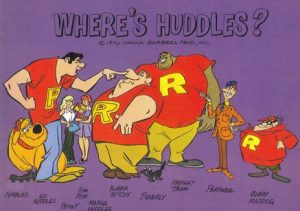 Bubba, who lives up to his nickname by being under the best of circumstances the “widest” of receivers (in girth, that is), is finding himself in more trouble than usual. Having been indulging recently in calorie intake, he finds himself panting and puffing during morning workout exercises with the team. His blubber bounces so much in a series of jumping exercises, he drives himself like a pile driver into a hole in the field. Touch your toes? Forget it – Bubba’s lucky to even find them. The coach, as dim-witted as Alan Reed can usually portray him, can’t help but notice something’s not right. He orders Bubba on the scale for a weigh-in. “I wanna know your weight – to the nearest ton!” The team doctor at first thinks the scale reading looks good – until the coach notices Bubba has only one foot on the scale. When the other foot follows, Bubba plunges through the platform (as did Sergeant Snorkel last week), and the scale needle spins so wildly, it leaves the scale face and flies away like a propeller blade. The coach levels an ultimatum that Bubba slim down to playing weight by Sunday’s game, or gets traded to the Alaska Seals. Huddles attempts to stick up for Bubba, claiming they’re inseparable – if Bubba goes, he goes. The coach obliges by preparing to make the Seals a package deal of the pair of them.
Bubba, who lives up to his nickname by being under the best of circumstances the “widest” of receivers (in girth, that is), is finding himself in more trouble than usual. Having been indulging recently in calorie intake, he finds himself panting and puffing during morning workout exercises with the team. His blubber bounces so much in a series of jumping exercises, he drives himself like a pile driver into a hole in the field. Touch your toes? Forget it – Bubba’s lucky to even find them. The coach, as dim-witted as Alan Reed can usually portray him, can’t help but notice something’s not right. He orders Bubba on the scale for a weigh-in. “I wanna know your weight – to the nearest ton!” The team doctor at first thinks the scale reading looks good – until the coach notices Bubba has only one foot on the scale. When the other foot follows, Bubba plunges through the platform (as did Sergeant Snorkel last week), and the scale needle spins so wildly, it leaves the scale face and flies away like a propeller blade. The coach levels an ultimatum that Bubba slim down to playing weight by Sunday’s game, or gets traded to the Alaska Seals. Huddles attempts to stick up for Bubba, claiming they’re inseparable – if Bubba goes, he goes. The coach obliges by preparing to make the Seals a package deal of the pair of them.
The prospect of an Alaska trade doesn’t sit well with the families. “I always wanted furs”, says Mrs. Bubba, “but not to keep warm.” Huddles is left no choice but to play watchdog over Bubba to see that he doesn’t succumb to his food cravings. Bubba insists he has will power – until he hears the primeval call of “Dinner’s ready”, and bulldozes through hedgerows and lawn furniture to get to the dinner table. Huddles has to concede that Bubba may be fat, but he’s still fast. But Bubba is in for a disappointment. His wife serves him a dish of – two vitamin pills. The diet book said only one pill – but she thought he might be hungry. Bubba starts getting desperate. He tries to take a quick chomp of Pom Pom’s baby food, but swallows her rattle instead. He sticks his fork under the table in an attempt to find the dog dish of family pet Fumbles, but the clever dog keeps moving the dish, allowing Bubba to stab the fork into Huddles’ leg. Huddles has had it, and orders Bubba to go to bed.
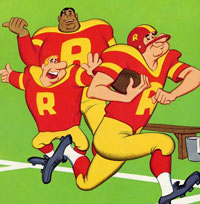 Neighbor Peevey noses his way into position to get wind of the fact that if Bubba doesn’t lose weight, the trade is imminent. For a man of his low ethical character, this presents the perfect opportunity for skullduggery – keep Bubba fat, and the neighborhood can be “savageless”. Having seeming access to unlimited financial resources to accomplish his aim, Peevey obtains an ice cream truck, and disguises as a driver. Pulling the truck right into Bubba’s driveway, Peevey knocks on Bubba’s door in the middle of the night, claiming his truck broke down, and asking to park it in the driveway until morning. He tells Bubba that the cargo will melt overnight, so he can help himself to all the ice cream he can eat – including the irresistible “tutti-fruitti”. Just to add frosting to the cake, a ring at Bubba’s back door presents another surprise visitor – a girl scout (Peevey in drag) with a box chock full of cookies. Peevey leaves the box with Bubba while asking for no remuneration (claiming “she” hasn’t got change, and will come back for the purchase price in the morning). Bubba thinks he’s dreaming – but knows he needs help. He calls Huddles, who insists Bubba must be hallucinating from hunger. Huddles tells him to ignore it all. But a mystery briefcase plops in at the window, with a tape player inside as in an episode of “Mission Impossible”. Bubba’s mission, should he decide to accept, is to eat a steaming hot helping of spaghetti and meatballs in a second compartment of the suitcase, before the suitcase self-destructs. Bubba frantically calls Huddles again. Huddles is so sure this has to be a dream, he tells Bubba that if it’ll make him happy, he can eat the imaginary food. At that moment, the suitcase explodes – and a few strands of spaghetti land in Huddles room through the window. This is no dream. “Don’t do ir!”, shouts Huddles, and flies out of the house for a quick interception before Bubba (singing a lyric from “The Impossible Dream”) can sink teeth into any remaining meatballs. Huddles has no idea where Bubba got the food, but spends most of the night adding additional precautions – in the form of boarding up all the windows and doors of Bubba’s house, and standing guard with Freight Train to patrol the grounds to see that no new supplies enter. Peevey is again one step ahead of the boys, and sets up in his backyard a mortar launcher. He launches a test shot above the guarding patrol’s heads, into the chimney of Bubba’s home. The first can has a note tied to it, announcing that “a friend” is about to commence operation food-drop. Suddenly, a barrage of canned food, cheeses, salami, and even a little wine, drops down the chimney. “There is a Santy Claus”, reacts Bubba.
Neighbor Peevey noses his way into position to get wind of the fact that if Bubba doesn’t lose weight, the trade is imminent. For a man of his low ethical character, this presents the perfect opportunity for skullduggery – keep Bubba fat, and the neighborhood can be “savageless”. Having seeming access to unlimited financial resources to accomplish his aim, Peevey obtains an ice cream truck, and disguises as a driver. Pulling the truck right into Bubba’s driveway, Peevey knocks on Bubba’s door in the middle of the night, claiming his truck broke down, and asking to park it in the driveway until morning. He tells Bubba that the cargo will melt overnight, so he can help himself to all the ice cream he can eat – including the irresistible “tutti-fruitti”. Just to add frosting to the cake, a ring at Bubba’s back door presents another surprise visitor – a girl scout (Peevey in drag) with a box chock full of cookies. Peevey leaves the box with Bubba while asking for no remuneration (claiming “she” hasn’t got change, and will come back for the purchase price in the morning). Bubba thinks he’s dreaming – but knows he needs help. He calls Huddles, who insists Bubba must be hallucinating from hunger. Huddles tells him to ignore it all. But a mystery briefcase plops in at the window, with a tape player inside as in an episode of “Mission Impossible”. Bubba’s mission, should he decide to accept, is to eat a steaming hot helping of spaghetti and meatballs in a second compartment of the suitcase, before the suitcase self-destructs. Bubba frantically calls Huddles again. Huddles is so sure this has to be a dream, he tells Bubba that if it’ll make him happy, he can eat the imaginary food. At that moment, the suitcase explodes – and a few strands of spaghetti land in Huddles room through the window. This is no dream. “Don’t do ir!”, shouts Huddles, and flies out of the house for a quick interception before Bubba (singing a lyric from “The Impossible Dream”) can sink teeth into any remaining meatballs. Huddles has no idea where Bubba got the food, but spends most of the night adding additional precautions – in the form of boarding up all the windows and doors of Bubba’s house, and standing guard with Freight Train to patrol the grounds to see that no new supplies enter. Peevey is again one step ahead of the boys, and sets up in his backyard a mortar launcher. He launches a test shot above the guarding patrol’s heads, into the chimney of Bubba’s home. The first can has a note tied to it, announcing that “a friend” is about to commence operation food-drop. Suddenly, a barrage of canned food, cheeses, salami, and even a little wine, drops down the chimney. “There is a Santy Claus”, reacts Bubba.
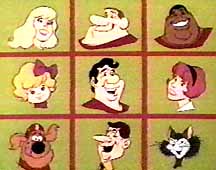 The next day, Huddles and Freight Train pull up a car in fromt of the McCoy home to drive Bubba to the game. They are shocked when Bubba emerges, the very ground trembling at each step of the behemoth into which he has grown. Bubba can offer little in the way of apology, admitting that the urges were simply too much for him. Huddles can only see visions of his next next-door neighbor being a polar bear. The boys show up at the staduim, and the coach calls for a team weigh-in. Bubba lingers just outside the team doctor’s office, hoping the coach might overlook him. But the coach howls for Bubba to present himself. Huddles hits on a possibility to fool the scale – inflate Bubba’s pants with helium gas from the stadium balloon vendor. The trick brings about a surprising weight reading – 96 pounds? The coach figures the scale must be broken, and gives Bubba a brief reprieve, to be weighed after the game. Having inflated trousers, however, has definite drawbacks on the field – Bubba can’t maintain a footing, and keeps drifting skywatd, having to be dragged back to Earth by his teammates. This leaves him with no ability to brace for the onslaught of the offensive line, who merely push him aside or spin him around like a top, allowing Huddles to be repeatedly sacked. The coach is so irate, he’s ready to ship Bubba off to the frozen North whether or not he passes the weigh-in. Meanwhile, Peevey, known as a football hater, oddly shows up at the game, wishing to see the last farewell of the two “barbarians”, and be sure that his plan worked to perfection. Seeing the predicament of Bubba’s floating, Peevey guesses at the trick the boys have pulled, and launches his own counter-measure to have Bubba’s true weight revealed. Producing a pin and a noisemaker horn, Peevey uses the horn as a blow gun, to fire the pin into Bubba’s pants. Bubba is in the middle of a fumble, recovering the ball with a circle of opposing players surrounding him on all sides. The pin pops his trousers – and Bubba takes off in the force of the jet stream of escaping gas, rocketing in zig-zag fashion across the field, over the heads of opponents and out of the reach of their defensive squad – and scores the game-winning touchdown. The coach is in ecstacy, shouting that fat or no fat, anyone who can move with such speed stays on his team. A happy ending ensues, for all except Peevey, who realizes he has just burst his own bubble.
The next day, Huddles and Freight Train pull up a car in fromt of the McCoy home to drive Bubba to the game. They are shocked when Bubba emerges, the very ground trembling at each step of the behemoth into which he has grown. Bubba can offer little in the way of apology, admitting that the urges were simply too much for him. Huddles can only see visions of his next next-door neighbor being a polar bear. The boys show up at the staduim, and the coach calls for a team weigh-in. Bubba lingers just outside the team doctor’s office, hoping the coach might overlook him. But the coach howls for Bubba to present himself. Huddles hits on a possibility to fool the scale – inflate Bubba’s pants with helium gas from the stadium balloon vendor. The trick brings about a surprising weight reading – 96 pounds? The coach figures the scale must be broken, and gives Bubba a brief reprieve, to be weighed after the game. Having inflated trousers, however, has definite drawbacks on the field – Bubba can’t maintain a footing, and keeps drifting skywatd, having to be dragged back to Earth by his teammates. This leaves him with no ability to brace for the onslaught of the offensive line, who merely push him aside or spin him around like a top, allowing Huddles to be repeatedly sacked. The coach is so irate, he’s ready to ship Bubba off to the frozen North whether or not he passes the weigh-in. Meanwhile, Peevey, known as a football hater, oddly shows up at the game, wishing to see the last farewell of the two “barbarians”, and be sure that his plan worked to perfection. Seeing the predicament of Bubba’s floating, Peevey guesses at the trick the boys have pulled, and launches his own counter-measure to have Bubba’s true weight revealed. Producing a pin and a noisemaker horn, Peevey uses the horn as a blow gun, to fire the pin into Bubba’s pants. Bubba is in the middle of a fumble, recovering the ball with a circle of opposing players surrounding him on all sides. The pin pops his trousers – and Bubba takes off in the force of the jet stream of escaping gas, rocketing in zig-zag fashion across the field, over the heads of opponents and out of the reach of their defensive squad – and scores the game-winning touchdown. The coach is in ecstacy, shouting that fat or no fat, anyone who can move with such speed stays on his team. A happy ending ensues, for all except Peevey, who realizes he has just burst his own bubble.
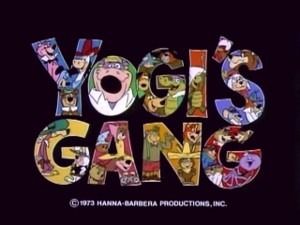 Mr. Waste (Hanna-Barbera, Yogi’s Gang, 10/27/73) – A famous record of the 40’s by Red Ingle and the Natural 7 began with the words, “A preachment, dear friends, you are about to receive…” The intro should have preceded every episode of this series, one of the sorriest projects to ever disgrace the Hanna-Barbera legacy. To its credit, it was one of the first ventures of the studio to try to reassemble under one roof a cast of all its famous animal stars of the past, and at least provided royalty checks to many of the studio’s favorite voice-over cast members. But entirely defeating the promise which was eagerly looked forward to by kids of the day from this all-star format were the motivation-driven morality play scripts that beset the entire series, placing every character in as likely a position as any other to be dealing out life lessons to the tiny tots. Thus, every character was played out-of-character for the usual personality traits that we fell in love with when each star was in his or her heyday, exhibiting nearly none of the quirks, temptations, and weaknesses that typically got them into enough trouble to support a plot. Cutting all the starring characters from the same cloth meant that there was no dependable source of comic relief to soften the blow of the hackneyed and over-driven plot points of what conduct the kiddies should strive not to do, making a series nominally about a bear virtually unbearable. It didn’t take more than a few episodes for the kids to realize that watching these snooze-reels wasn’t even going to generate a minimum quota of half-smiles, but seemed only intended to leave the viewer aghast that their cartoon favorites could be lead astray by villains so obviously named for any given vice that anyone with one-quarter of a mind should have easily been able to see through them. We thus lost all respect for the characters we loved, who appeared for at least half the show’s airtime to be blithering imbeciles manipulated like putty in the hands of the bad guys, in ways that were decidedly un-funny. At the time, with several of the lead characters having been out of circulation for several seasons, it almost made me wonder if my memory was failing me, and if these stars had ever been entertaining in the first place. To think now, with retrospect available at the touch of an Internet button, that any show could be written so badly as to achieve the result of nearly erasing from memory the sterling writing and clever wit of Hanna-Barbera’s early days, is a mind-shattering concept.
Mr. Waste (Hanna-Barbera, Yogi’s Gang, 10/27/73) – A famous record of the 40’s by Red Ingle and the Natural 7 began with the words, “A preachment, dear friends, you are about to receive…” The intro should have preceded every episode of this series, one of the sorriest projects to ever disgrace the Hanna-Barbera legacy. To its credit, it was one of the first ventures of the studio to try to reassemble under one roof a cast of all its famous animal stars of the past, and at least provided royalty checks to many of the studio’s favorite voice-over cast members. But entirely defeating the promise which was eagerly looked forward to by kids of the day from this all-star format were the motivation-driven morality play scripts that beset the entire series, placing every character in as likely a position as any other to be dealing out life lessons to the tiny tots. Thus, every character was played out-of-character for the usual personality traits that we fell in love with when each star was in his or her heyday, exhibiting nearly none of the quirks, temptations, and weaknesses that typically got them into enough trouble to support a plot. Cutting all the starring characters from the same cloth meant that there was no dependable source of comic relief to soften the blow of the hackneyed and over-driven plot points of what conduct the kiddies should strive not to do, making a series nominally about a bear virtually unbearable. It didn’t take more than a few episodes for the kids to realize that watching these snooze-reels wasn’t even going to generate a minimum quota of half-smiles, but seemed only intended to leave the viewer aghast that their cartoon favorites could be lead astray by villains so obviously named for any given vice that anyone with one-quarter of a mind should have easily been able to see through them. We thus lost all respect for the characters we loved, who appeared for at least half the show’s airtime to be blithering imbeciles manipulated like putty in the hands of the bad guys, in ways that were decidedly un-funny. At the time, with several of the lead characters having been out of circulation for several seasons, it almost made me wonder if my memory was failing me, and if these stars had ever been entertaining in the first place. To think now, with retrospect available at the touch of an Internet button, that any show could be written so badly as to achieve the result of nearly erasing from memory the sterling writing and clever wit of Hanna-Barbera’s early days, is a mind-shattering concept.
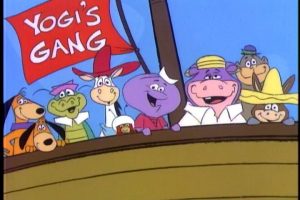 Case in point is this pointless episode. Villanous Mr. Waste (as subtlely named as his fellow cohorts Mr. Smog, Lotta Litter, Mr. Sloppy, Mr. Vandal, and Dr. Bigot, to name a few from other installents), dupes the gang into landing their flying ark on the island he presently inhabits, by mechanically producing a storm cloud that lays waste to most of the supplieson board the ark and also damages the ship’s hull. In a ploy common to scripts of the series, the villain masquerades as his polar opposite – Mr. Plenty – inviting the crew to stay awhile and partake of the bounty of good things upon the island. On their flight in, however, the crew noticed that several adjoining islands were entirely bare and barren, and galley cook Atom Ant is suspicious why. Mr. Waste encourages the gang to lounge around, wasting time, rather than repair the ship, and to use the various good things on the island – but only use them once, “as we have plenty”. He tells Magilla Gorilla to only eat the tip of every banana, as the rest of the fruit is below his dignity, and merely “a uselsess core”. Magilla is puzzled that he’s never heard this before, but goes along with this new eating technique. Eventually, Mr. Waste shows off a gigantic computerized machine which he uses to produce the good things of the island, claiming it can create virtually anything. To prove his boast, he thows the crew a luau, rolling the food to the crew on a large conveyor belt out of the machine – but with the express instruction that they must take only a small nibble from each item of foodstuffs, then let the rest of it pass or toss the item away.
Case in point is this pointless episode. Villanous Mr. Waste (as subtlely named as his fellow cohorts Mr. Smog, Lotta Litter, Mr. Sloppy, Mr. Vandal, and Dr. Bigot, to name a few from other installents), dupes the gang into landing their flying ark on the island he presently inhabits, by mechanically producing a storm cloud that lays waste to most of the supplieson board the ark and also damages the ship’s hull. In a ploy common to scripts of the series, the villain masquerades as his polar opposite – Mr. Plenty – inviting the crew to stay awhile and partake of the bounty of good things upon the island. On their flight in, however, the crew noticed that several adjoining islands were entirely bare and barren, and galley cook Atom Ant is suspicious why. Mr. Waste encourages the gang to lounge around, wasting time, rather than repair the ship, and to use the various good things on the island – but only use them once, “as we have plenty”. He tells Magilla Gorilla to only eat the tip of every banana, as the rest of the fruit is below his dignity, and merely “a uselsess core”. Magilla is puzzled that he’s never heard this before, but goes along with this new eating technique. Eventually, Mr. Waste shows off a gigantic computerized machine which he uses to produce the good things of the island, claiming it can create virtually anything. To prove his boast, he thows the crew a luau, rolling the food to the crew on a large conveyor belt out of the machine – but with the express instruction that they must take only a small nibble from each item of foodstuffs, then let the rest of it pass or toss the item away.
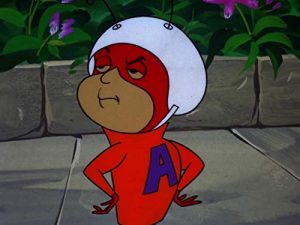 Atom Ant repeatedly tries to warn the impossibly gullible gang that something’s not right here, and that this all goes against the grain of his mother’s teachings by which ants live, to always save their resources. Atom also wonders about a large fence behind Mr. Waste’s machine, which Waste forbids them to venture past. As Waste rolls out a conveyor full of banana splits for dessert, Atom appears on the belt, and informs Yogi he’s discovered their host’s secret, asking Yogi and Boo Boo to accompany him to the wall. Atom has raised a ladder to the top of the wall, and Yogi and Boo Boo peer over – reacting in shock at a view of two thirds of the island, devastated and leveled, with the claw-like mechanical arms of the machine’s inner workings just cutting down the last banana trees on the island. We and the bears are left to deal with the horror that our good guys have helped lay waste to an entire island paradise. They and Atom return to the banquet room, where Atom forces the villain to reveal his hand, by requesting a banana split for himself. Out from the machine rolls an empty bowl. Atom informs the crew how the villain’s machine destroyed all the supplies of the island. Mr. Waste chortles, “So what? There are more islands we can move on to. Who’s with me?” When the crew of dum-dums suddenly becomes wise enough not to follow the villain’s lead, the villain still laughs at them, saying, “You wasted your opportunity!” He packs up his equipment and takes off on a private ship, leaving the crew stranded, seemingly with nothing left on the island to replenish their sipplies or to repair the ark. But Atom, the only one showing any intelligence this week, has secretly stashed away in the hold, before Mr. Waste’s machine could finish its work, just enough food and equipment to allow for the ark repair, and to sustain the crew on the next leg of their journey. The reformed crew praise Atom for his timely singlehanded efforts, and vow not to waste what he has saved. Will the child audience thus ever indulge in the vice of gluttony? Hopefully, as the sensible half of them probably turned off their sets before this abomination was halfway through.
Atom Ant repeatedly tries to warn the impossibly gullible gang that something’s not right here, and that this all goes against the grain of his mother’s teachings by which ants live, to always save their resources. Atom also wonders about a large fence behind Mr. Waste’s machine, which Waste forbids them to venture past. As Waste rolls out a conveyor full of banana splits for dessert, Atom appears on the belt, and informs Yogi he’s discovered their host’s secret, asking Yogi and Boo Boo to accompany him to the wall. Atom has raised a ladder to the top of the wall, and Yogi and Boo Boo peer over – reacting in shock at a view of two thirds of the island, devastated and leveled, with the claw-like mechanical arms of the machine’s inner workings just cutting down the last banana trees on the island. We and the bears are left to deal with the horror that our good guys have helped lay waste to an entire island paradise. They and Atom return to the banquet room, where Atom forces the villain to reveal his hand, by requesting a banana split for himself. Out from the machine rolls an empty bowl. Atom informs the crew how the villain’s machine destroyed all the supplies of the island. Mr. Waste chortles, “So what? There are more islands we can move on to. Who’s with me?” When the crew of dum-dums suddenly becomes wise enough not to follow the villain’s lead, the villain still laughs at them, saying, “You wasted your opportunity!” He packs up his equipment and takes off on a private ship, leaving the crew stranded, seemingly with nothing left on the island to replenish their sipplies or to repair the ark. But Atom, the only one showing any intelligence this week, has secretly stashed away in the hold, before Mr. Waste’s machine could finish its work, just enough food and equipment to allow for the ark repair, and to sustain the crew on the next leg of their journey. The reformed crew praise Atom for his timely singlehanded efforts, and vow not to waste what he has saved. Will the child audience thus ever indulge in the vice of gluttony? Hopefully, as the sensible half of them probably turned off their sets before this abomination was halfway through.
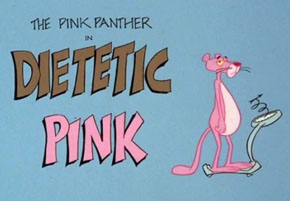 Dietetic Pink (DePatie-Freleng, Pink Panther, 11/11/78 – Sid Marcus, dir.) – A late series entry in the waning days of the character’s original run, actually made for direct screening on television, but later theatrically issued. Pink happens upon a coin-operated weigh scale, and inserts a coin. A traveling man passes on the street behind him, and, in entire disregard for what the panther is trying to do, places his heavy suitcase on the scale platform behind Pink while the man takes a breather from lugging it around. The combined weight of panther and suitcase twirls the scale’s needle to 220 pounds. The shocked panther visualizes himself as bloating into a blimp. He heads home, and inspects his surroundings, mainly consisting of a refrigerator jam-packed with fattening food. Armful by armful, the panther totes the items out of the refrigerator and into a wooden cupboard. Oblivious to the fact that these foods will perish without refrigeration, the panther packs the last of the food in as if packing a sardine can, then locks the wooden cupboard doors. He then takes the key, batters its shaft with a hammer until bent at several right angles, and tosses the key out the window into a trash can. So much for ever seeing his food again.
Dietetic Pink (DePatie-Freleng, Pink Panther, 11/11/78 – Sid Marcus, dir.) – A late series entry in the waning days of the character’s original run, actually made for direct screening on television, but later theatrically issued. Pink happens upon a coin-operated weigh scale, and inserts a coin. A traveling man passes on the street behind him, and, in entire disregard for what the panther is trying to do, places his heavy suitcase on the scale platform behind Pink while the man takes a breather from lugging it around. The combined weight of panther and suitcase twirls the scale’s needle to 220 pounds. The shocked panther visualizes himself as bloating into a blimp. He heads home, and inspects his surroundings, mainly consisting of a refrigerator jam-packed with fattening food. Armful by armful, the panther totes the items out of the refrigerator and into a wooden cupboard. Oblivious to the fact that these foods will perish without refrigeration, the panther packs the last of the food in as if packing a sardine can, then locks the wooden cupboard doors. He then takes the key, batters its shaft with a hammer until bent at several right angles, and tosses the key out the window into a trash can. So much for ever seeing his food again.
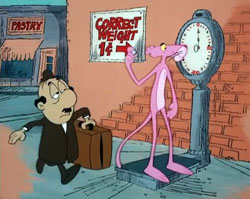 The panther starts an exercise regimen – weight lifting, skipping rope, and push-ups – after which he lies exhausted on a couch. Yet he cannot fall off to sleep, as all he sees are images of scrumptious food. He starts to weaken, taking an axe to the cupboard doors, but remembers the scale reading, and thinks better of his efforts. Watching TV does little to change his mood, as all he can find over the airwaves are cooking shows and food comercials. The TV set promptly gets tossed in a closet, and the door boarded up.
The panther starts an exercise regimen – weight lifting, skipping rope, and push-ups – after which he lies exhausted on a couch. Yet he cannot fall off to sleep, as all he sees are images of scrumptious food. He starts to weaken, taking an axe to the cupboard doors, but remembers the scale reading, and thinks better of his efforts. Watching TV does little to change his mood, as all he can find over the airwaves are cooking shows and food comercials. The TV set promptly gets tossed in a closet, and the door boarded up.
Now a new temptation arises, from the wafting aromas of a hot dog wagon selling its wares just outside the panther’s window. Pink goes through a bipolar crisis, alternating between repeatedly ordering hot dogs from the vendor, then remembering his resolve and turning down the dogs after they are fully constructed. But every time he turns his back on the vendor, visions of hot dogs dance through his head – and even a passing dachshund looks like the genuine article. Finally, the vendor can’t take receiving any more orders, and applies the mustard all over Pink’s face, and the bottle atop Pink’s head.
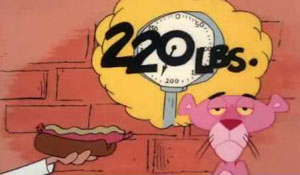 Pink finds what might be the answer to his prayer – an eatery named the “Diet Diner”. He orders up for what he hopes will be a feast. Instead, he is brought a large covered serving tray, containing a single food pellet. Pink tries to stick a fork into the pellet, but it rolls off the plate, over to a knothole in the wooden floor – out of which appears a mouse, who swallows the pellet, then waves goodbye. Behind the panther approaches the waiter, with a bill for $25.00 for dinner. Pink irately tears up the bill as utter nonsense. The waiter, unphased by such behavior (no doubt he sees it from all his customers), blows a small whistle, which summons a policeman. Pink exits the restaurant feet first, with the cop hot in pursuit. Just as in Deputy Dawg’s episide previously reviewed in this series, the chase through the city streets leaves the panther huffing and puffing, as he finds himself back where everything started – at the weigh scale. Pink takes a quick opportunity to drop another coin in, and finds his true weight to be only 75 pounds. As the cop catches up, to his surprise he finds the panther shaking his hand in thanks, and pointing to the scale result that was caused by the cop’s pursuit. To make amends, the panther invites the cop to dinner at the poshest swank restaurant in town (El Superbo), where he and the cop chow down upon a banquet table of goodies, as Pink winks at the camera for the fade out.
Pink finds what might be the answer to his prayer – an eatery named the “Diet Diner”. He orders up for what he hopes will be a feast. Instead, he is brought a large covered serving tray, containing a single food pellet. Pink tries to stick a fork into the pellet, but it rolls off the plate, over to a knothole in the wooden floor – out of which appears a mouse, who swallows the pellet, then waves goodbye. Behind the panther approaches the waiter, with a bill for $25.00 for dinner. Pink irately tears up the bill as utter nonsense. The waiter, unphased by such behavior (no doubt he sees it from all his customers), blows a small whistle, which summons a policeman. Pink exits the restaurant feet first, with the cop hot in pursuit. Just as in Deputy Dawg’s episide previously reviewed in this series, the chase through the city streets leaves the panther huffing and puffing, as he finds himself back where everything started – at the weigh scale. Pink takes a quick opportunity to drop another coin in, and finds his true weight to be only 75 pounds. As the cop catches up, to his surprise he finds the panther shaking his hand in thanks, and pointing to the scale result that was caused by the cop’s pursuit. To make amends, the panther invites the cop to dinner at the poshest swank restaurant in town (El Superbo), where he and the cop chow down upon a banquet table of goodies, as Pink winks at the camera for the fade out.
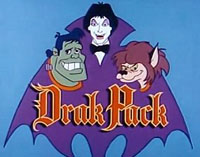 Drak Pack (Hanna-Barbera (Australian div.), 1980) – I confess to never watching (until yesterday) an episode of this series, so I have no idea in what episode it appeared, but my colleague James Parten (Needle Drop Notes) recalls a line by Count Dracula (known as “Big D” to the trio of monster descendants who play the heroic element of the show) which belongs along our trail. The trend of low-calorie alternative beverages had begun in earnest around the 1960’s, with such items as Coca Cola’s low calorie beverage “Tab” (later replaced by Diet Coke in the 1980’s), and items such as MetreCal, described by many as a “chalky” meal replacement shake (and immortalized by name inclusion in an Allan Sherman parody lyric on the My Son, the Celebrity LP). The trend was still with us during the 1980’s, when Big D finds himself with only a supply of plasma for sustenance, and reacts with disdain, “I hate those diet drinks!”
Drak Pack (Hanna-Barbera (Australian div.), 1980) – I confess to never watching (until yesterday) an episode of this series, so I have no idea in what episode it appeared, but my colleague James Parten (Needle Drop Notes) recalls a line by Count Dracula (known as “Big D” to the trio of monster descendants who play the heroic element of the show) which belongs along our trail. The trend of low-calorie alternative beverages had begun in earnest around the 1960’s, with such items as Coca Cola’s low calorie beverage “Tab” (later replaced by Diet Coke in the 1980’s), and items such as MetreCal, described by many as a “chalky” meal replacement shake (and immortalized by name inclusion in an Allan Sherman parody lyric on the My Son, the Celebrity LP). The trend was still with us during the 1980’s, when Big D finds himself with only a supply of plasma for sustenance, and reacts with disdain, “I hate those diet drinks!”
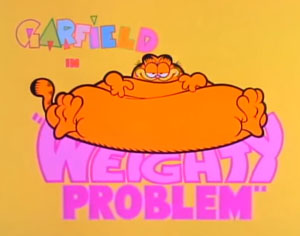 Weighty Problem (Film Roman, Garfield and Friends, 10/29/88) – Fat cat Garfield has had quite a share of diet/exercise encounters in his animated career, others of which we will delve into in subsequent chapters. This time, his troubles begin when Jon arrives home, having purchased a new talking bathroom scale, which determines your ideal weight for your height, amd predicts your fortune as well. As Jon slips out of his clothes to prepare for a weigh-in, Garfield sighs, “No point in delaying the bad news”, and sets a foot upon the scale. “One at a time, please”, quips the scale, with Garfield’s weight not even half distributed upon it. Garfield pulls his foot back, then tries again. “I don’r do trucks,” the scale replies. Garfield is getting miffed at being so efficiently insulted by a machine, which continues, “Let me guess. You’re an ocean liner.” Garfield leaps on the device with both feet, and an alarm siren wails, as the scale begs, “Get Off! Get Off!” Garfield demamds the scale quit kidding around, and finally learns he is “20 pounds overweight, or nine inches undertall.” Garfield decides to have some revenge by tampering with the scale’s calibration. As Jon appears in his briefs, he receives the bad news from the scale that he is “50 pounds overweight. Your fortune is, you will go on a strict diet.” Jon asks Garfield to help him keep to his diet, to which the mischievous cat agrees.
Weighty Problem (Film Roman, Garfield and Friends, 10/29/88) – Fat cat Garfield has had quite a share of diet/exercise encounters in his animated career, others of which we will delve into in subsequent chapters. This time, his troubles begin when Jon arrives home, having purchased a new talking bathroom scale, which determines your ideal weight for your height, amd predicts your fortune as well. As Jon slips out of his clothes to prepare for a weigh-in, Garfield sighs, “No point in delaying the bad news”, and sets a foot upon the scale. “One at a time, please”, quips the scale, with Garfield’s weight not even half distributed upon it. Garfield pulls his foot back, then tries again. “I don’r do trucks,” the scale replies. Garfield is getting miffed at being so efficiently insulted by a machine, which continues, “Let me guess. You’re an ocean liner.” Garfield leaps on the device with both feet, and an alarm siren wails, as the scale begs, “Get Off! Get Off!” Garfield demamds the scale quit kidding around, and finally learns he is “20 pounds overweight, or nine inches undertall.” Garfield decides to have some revenge by tampering with the scale’s calibration. As Jon appears in his briefs, he receives the bad news from the scale that he is “50 pounds overweight. Your fortune is, you will go on a strict diet.” Jon asks Garfield to help him keep to his diet, to which the mischievous cat agrees.
 At lunch, Garfield piles his usual helping of food high upon many plates, while Jon asks. ‘”Is this all the diet book says I get for lunch? One lettuce leaf?” Garfield consults the book, and corrects his mistake – tearing away half the lettuce leaf and eating it himself. Jon announces he’s going to work out. “Good” said Garfield. “And you’re going to work out with me”, saud Jon. “Bad”, says Garfield. A witty production number follows. Jon fishes for his old equipment in a closet, remarking, “Here’s my dumbbell.” “Here’s my dumbbell”, says Garfield, pointing at Jon. “Whar’s wrong with a little exercise?”, says Jon. “What’s wrong with a little extra size?”, counters Garfield. “We’ll start by skipping rope”, says Jon. “Great – and then we’ll skip the sitips, and the push-ups, and…” continues Garfield. Jon suggests jogging. Garfield tuckers out quickly, and collapses. Jon points out that they are still in front of the house. “Yeah, but it’s a long driveway”, gasps Garfield. Jon tries to lift two weights hooked to rope and pulley. They are too tough to lift both himself, so he hands one rope pull to Garfield while he strains to lift the other. Gardield spots an apple on the ground – and hands off the second rope to Jon. Now leaving him at the mercy of two weights, Jon is yanked past the weights, and through the house wall. “Well now, that’s not nice”, says Garfield to the dazed Jon. “If you were gonna take a break, at least you could’ve told me.”
At lunch, Garfield piles his usual helping of food high upon many plates, while Jon asks. ‘”Is this all the diet book says I get for lunch? One lettuce leaf?” Garfield consults the book, and corrects his mistake – tearing away half the lettuce leaf and eating it himself. Jon announces he’s going to work out. “Good” said Garfield. “And you’re going to work out with me”, saud Jon. “Bad”, says Garfield. A witty production number follows. Jon fishes for his old equipment in a closet, remarking, “Here’s my dumbbell.” “Here’s my dumbbell”, says Garfield, pointing at Jon. “Whar’s wrong with a little exercise?”, says Jon. “What’s wrong with a little extra size?”, counters Garfield. “We’ll start by skipping rope”, says Jon. “Great – and then we’ll skip the sitips, and the push-ups, and…” continues Garfield. Jon suggests jogging. Garfield tuckers out quickly, and collapses. Jon points out that they are still in front of the house. “Yeah, but it’s a long driveway”, gasps Garfield. Jon tries to lift two weights hooked to rope and pulley. They are too tough to lift both himself, so he hands one rope pull to Garfield while he strains to lift the other. Gardield spots an apple on the ground – and hands off the second rope to Jon. Now leaving him at the mercy of two weights, Jon is yanked past the weights, and through the house wall. “Well now, that’s not nice”, says Garfield to the dazed Jon. “If you were gonna take a break, at least you could’ve told me.”
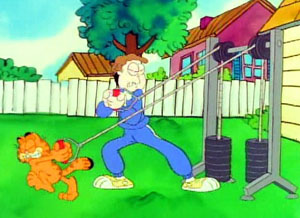 Jon finally puts on an aerobics workout record. Garfield can’t stand much more of this, and decides to get things over faster by switching the phonograph speed to 78. Jon waves his arms so fast, he takes off like a bird, and Garfield decides he better cut this out before Jon flies South for the winter. The record is switched off, and Jon crashes like an airplane. “You’d better stop trying to improve your health before you remove your health”, warns Garfield. While Jon is out, Garfield decides enough is enough, and resets the scale to its original settings. He tests it by standing on the platform. “You are still 20 pounds overweight. Your fortune is, you are about to get more exercise.” “More exercise?”, questions Garfield. Jon enters to find out his progress, and is delighted to hear the scale state he is back to normal weight. He is dismayed, however, to hear the scale state, “Your fortune is, you will punish your cat for tampering with the scale earlier.” A split second before they happen, the scale continues with its predictions: “You will chase your cat around the living room. He will slip on the throw rug, swing from the chandelier, and crash into the wall.” “Boy, are those things accurate”, observes Garfield. As the two disappear in their chase, the scale continues to predict, “You will chase him out the front door. You will chase him down the block – and they lived heavily ever after. THE END – END – END – END…”
Jon finally puts on an aerobics workout record. Garfield can’t stand much more of this, and decides to get things over faster by switching the phonograph speed to 78. Jon waves his arms so fast, he takes off like a bird, and Garfield decides he better cut this out before Jon flies South for the winter. The record is switched off, and Jon crashes like an airplane. “You’d better stop trying to improve your health before you remove your health”, warns Garfield. While Jon is out, Garfield decides enough is enough, and resets the scale to its original settings. He tests it by standing on the platform. “You are still 20 pounds overweight. Your fortune is, you are about to get more exercise.” “More exercise?”, questions Garfield. Jon enters to find out his progress, and is delighted to hear the scale state he is back to normal weight. He is dismayed, however, to hear the scale state, “Your fortune is, you will punish your cat for tampering with the scale earlier.” A split second before they happen, the scale continues with its predictions: “You will chase your cat around the living room. He will slip on the throw rug, swing from the chandelier, and crash into the wall.” “Boy, are those things accurate”, observes Garfield. As the two disappear in their chase, the scale continues to predict, “You will chase him out the front door. You will chase him down the block – and they lived heavily ever after. THE END – END – END – END…”
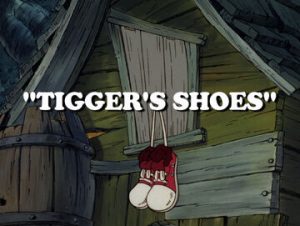 Tigger’s Shoes (Disney, New Adventures of Winnie the Pooh, 2/4/89) – Tigger’s in another of his bouncing moods, pouncing on rabbit and scattering his cabbage harvest to the winds. Rabbit’s request that Tigger stop at least until the harvest is over falls on the usual deaf ears, as Rabbit repeats aloud in unison with Tigger the excuse he’s heard umpteen times before, “That’s what Tiggers do best.” Then Rabbit hits on an idea to keep Tigger busy. He shows Tigger a tall cliffside, known as Castle Ridge, and suggest Tigger practice his bouncing on that. Tigger scoffs that he can easily take that ridge in two bounces. Rabbit concocts a lie, that one of his famous relatives, the world’s champion Bunny of Upsadaisia, can take it in one bounce. Tigger thinks himself up to the challenge, and launches himself skyward – but comes to a stop at the halfway point of the slope, and falls back upon Rabbit. “This is going to take some serious practicin’‘, says Tigger. Rabbit receives a few minutes peace as Tigger tries to knock himself out with his effort, but Tigger returns on another collision with Rabbit, to claim that the slope is “impossibibble”, and begging Rabbit to help him. Rabbit doubles up on the lie, claiming he has possession of the champion Bunny’s secret, and will give Tigger the loan of them in return for Tigger rounding up the cabbage harvest – a secret pair of jumping shoes. Rabbit disappears into his hutch to fetch them. He grabs an old pair of oversized sneakers, but modified them by turning them into the equivalent of “loaded gloves” – making a hidden compartment in the toes of the shoes, into which he sews an assortment of the heaviest metal junk he can find. Rabbit tues the laces onto Tigger’s feet, and Tigger prepares for a stratospheric leap – but finds his feet virtually bolted to the ground by excess weight. Rabbit tells him the shoes were designed for a big bunny, and will take some getting used to. He insists, however, that, once the shoes are mastered, the Great Bunny could bounce the ridge even in his sleep. Tigger gasps, “He must work nights.” Despite his ability only to rise a few inches off the ground, then come crashing back down with an Earth-shaking thud, Tigger determines that he will learn the secret of the shoes, and best the Great Bunny at his own game.
Tigger’s Shoes (Disney, New Adventures of Winnie the Pooh, 2/4/89) – Tigger’s in another of his bouncing moods, pouncing on rabbit and scattering his cabbage harvest to the winds. Rabbit’s request that Tigger stop at least until the harvest is over falls on the usual deaf ears, as Rabbit repeats aloud in unison with Tigger the excuse he’s heard umpteen times before, “That’s what Tiggers do best.” Then Rabbit hits on an idea to keep Tigger busy. He shows Tigger a tall cliffside, known as Castle Ridge, and suggest Tigger practice his bouncing on that. Tigger scoffs that he can easily take that ridge in two bounces. Rabbit concocts a lie, that one of his famous relatives, the world’s champion Bunny of Upsadaisia, can take it in one bounce. Tigger thinks himself up to the challenge, and launches himself skyward – but comes to a stop at the halfway point of the slope, and falls back upon Rabbit. “This is going to take some serious practicin’‘, says Tigger. Rabbit receives a few minutes peace as Tigger tries to knock himself out with his effort, but Tigger returns on another collision with Rabbit, to claim that the slope is “impossibibble”, and begging Rabbit to help him. Rabbit doubles up on the lie, claiming he has possession of the champion Bunny’s secret, and will give Tigger the loan of them in return for Tigger rounding up the cabbage harvest – a secret pair of jumping shoes. Rabbit disappears into his hutch to fetch them. He grabs an old pair of oversized sneakers, but modified them by turning them into the equivalent of “loaded gloves” – making a hidden compartment in the toes of the shoes, into which he sews an assortment of the heaviest metal junk he can find. Rabbit tues the laces onto Tigger’s feet, and Tigger prepares for a stratospheric leap – but finds his feet virtually bolted to the ground by excess weight. Rabbit tells him the shoes were designed for a big bunny, and will take some getting used to. He insists, however, that, once the shoes are mastered, the Great Bunny could bounce the ridge even in his sleep. Tigger gasps, “He must work nights.” Despite his ability only to rise a few inches off the ground, then come crashing back down with an Earth-shaking thud, Tigger determines that he will learn the secret of the shoes, and best the Great Bunny at his own game.
Gopher has observed Rabbit’s manipulation of the shoes, and thinks the joke is being carried too far. Pooh and Piglet also witness Tigger’s hopeless efforts at the ridge, where he is barely able to rise a sixth of the way upwards, measuring his progress in chalk marks on the ridge only mere inches apart, and digging a crater in the dust at the foot of the hill with each thundering landing. Tigger insists the shoes are helping, though Piglet can easily see they’re holding him down. Tigger jumbles his account to the pair about the great Bunny, which Piglet misinterprets as the “Awful Bunny who works at night”. Pooh and Piglet both sigh that Tigger looks very tired, and as they walk away, Rabbit, checking up on the results of his prank, wonders why no one else thins his joke is funny.
 That night, Rabbit tries to repent, by slipping into Tigger’s house as Tigger sleeps, hoping to get back the shoes before anything else happens. But his search disturbs Tigger, who mumbles about the Great Bunny bouncing the ridge in his sleep, and rises from the bed with the blanket still completely covering him, bouncing out the window and into the forest. “He’s sleepbouncing”, gasps Rabbit. With no particular sense of direction, Tigger bounces into Pooh and Piglet’s home through the window, bounces on their stomachs in bed, then out the window again. Piglet is convinced it was the Awful Bunny, returned to the woods to retrieve his shoes. He and Pooh run to tell Tigger, who has found his way back to his bed and fallen asleep again, with Rabbit hanging outside the window from the windowsill, still unable to find the shoes. Pooh and Piglet awaken Tigger, informing him that the Awful Bunny has returned for the shoes. “It’s a good thing I hid them”, says Tigger, as he pulls a prop out from the wooden shutters above his window, causing the shoes to plop down, suspended to the shutters by their shoestrings. Of course, the blow clunks Rabbit in the head, making him fall from the tree to the ground below, while Tigger obliviously remarks, “Say, did you hear sump’in’?”
That night, Rabbit tries to repent, by slipping into Tigger’s house as Tigger sleeps, hoping to get back the shoes before anything else happens. But his search disturbs Tigger, who mumbles about the Great Bunny bouncing the ridge in his sleep, and rises from the bed with the blanket still completely covering him, bouncing out the window and into the forest. “He’s sleepbouncing”, gasps Rabbit. With no particular sense of direction, Tigger bounces into Pooh and Piglet’s home through the window, bounces on their stomachs in bed, then out the window again. Piglet is convinced it was the Awful Bunny, returned to the woods to retrieve his shoes. He and Pooh run to tell Tigger, who has found his way back to his bed and fallen asleep again, with Rabbit hanging outside the window from the windowsill, still unable to find the shoes. Pooh and Piglet awaken Tigger, informing him that the Awful Bunny has returned for the shoes. “It’s a good thing I hid them”, says Tigger, as he pulls a prop out from the wooden shutters above his window, causing the shoes to plop down, suspended to the shutters by their shoestrings. Of course, the blow clunks Rabbit in the head, making him fall from the tree to the ground below, while Tigger obliviously remarks, “Say, did you hear sump’in’?”
The next night, after another strenuous day of practicing, Tigger has rounded up Pooh, Piglet, and Rabbit to stand guard with him, as he barricades the door and boards up all the windows to keep the Bunny from making another attempt at the shoes. Rabbit tries to figure how to end this nightmare of lies, but can’t find an available opening for an explainable excuse. Rather than maintain their wide-awake guard, Tigger, Pooh and Piglet eventually fall asleep. Rabbit, however, pops an eye open, and when the coast is clear, unlaces the heavy shoes from Tigger’s feet, and drags them off in a sack out of sight. Tigger begins mumbling again, and before anyone can stop him, has leaped out the window again, covered by the blanket, in another spell of sleepbouncing. Pooh and Piglet awaken to observe the shadowy figure disappearing, and conclude that the Awful Bunny has abducted Tigger. They exit into the woods to attempt a rescue, while Rabbit lags behind, more concerned with where to dispose of the troublesome shoes. Pooh and Piglet follow the trail of bounced footprints, and come to the base of the ridge. High atop the topmost boulders of the rock formation, sleeps Tigger. Pooh and Piglet call to him, and Tigger opens his eyes, to realize that he just accomplished his goal – bouncing the ridge in his sleep. Rabbit is noticed nearby, dumping the sack of shoes into gopher’s hole. A loud “Ouch” is heard from below, as gopher was in the line of dumping. Gopher angrily tosses the shoes back to the surface, revealed for the others to see, then decides things have gone far enough, and unzips one of the toes of the shoes to reveal what was inside. “You mean Rabbit deliberately put big ol’ weights on my footsies?”, Tigger remarks in revelation. He then pounces on Rabbit – not in anger, but to congratulate him! Tigger realizes this was the best training idea imaginable, and that Rabbit helped him to truly become the champion bouncer – at least where Rabbits are concerned. However, he still has yet a greater challenge, for which he insists that Rabbit serve as his trainer. “I heard about this cow that jumped over the moon. Us Tiggers can’t let no cows be the bestest jumpers.” Rabbit faints on the spot from the suggestion, and Tigger remarks. “Overcome with excitement.”
Warner and Disney compete with Garfield next week, in an epic struggle of survival of the fittest.


 Charles Gardner is an animation enthusiast who toils by day as a member of LA Law – but by nights and weekends indulges in classic jazz and ragtime as a performer; and studies classic Hollywood cartoons… maybe a little too much.
Charles Gardner is an animation enthusiast who toils by day as a member of LA Law – but by nights and weekends indulges in classic jazz and ragtime as a performer; and studies classic Hollywood cartoons… maybe a little too much.










































































































































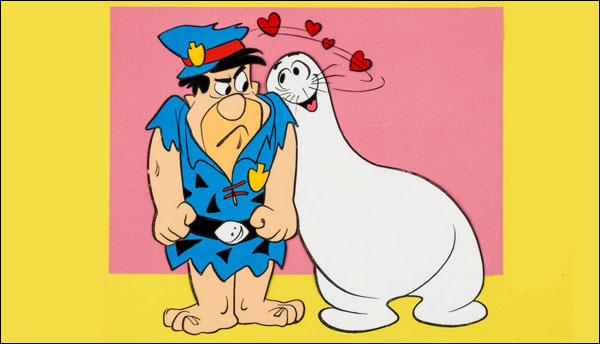
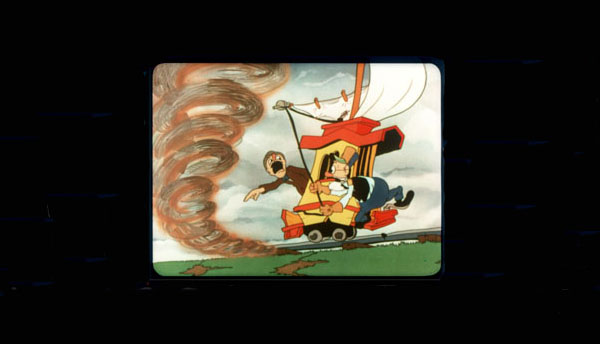






















Paul Lynde’s character in “Where’s Huddles” was Claude Pertwee. Pronounced by Ed Huddles as “Pert-wee” and by Marge as “Per-twee.” (A rather telling point that the characters couldn’t agree on the pronunciation of his name.)
I only remember watching one or two episodes of Where’s Huddles? The only thing I really remember was the Huddles family at the mailbox at the start of the show. I always loved Paul Lynde and his sneering voice in anything.
“Mr. Waste” was the only episode of “Yogi’s Gang” that I ever saw, but it left a deep and lasting impression, if by no means a favourable one. I had already noticed a steady decline in the quality of Saturday morning television starting in 1968, when Linus the Lionhearted and the Jay Ward and Total TV shows were all yanked off the air thanks to Peggy Charren and Action for Children’s Television. “Yogi’s Gang” was the final nail in the coffin. From then on I found other things to do with my weekends, and Saturday morning TV was dead to me. All the best cartoons, like Popeye, were on after school on weekdays anyway.
I’m a little surprised at how well I remember that awful episode. I remember that the assembled Hanna-Barbera characters tended to repeat statements in chorus, not once but twice (“Mister Waste!” “Mister Waste!”), because there were too many of them to fit in a single shot. I remember Atom Ant nagging the others in Don Messick’s Arnold the paperboy voice, as Howard Morris wouldn’t have been right for a non-comedic role. I even remember the sunflower on Mr. Plenty’s stupid hat. I couldn’t tell you how many times over the years I’ve quoted Atom Ant to some profligate friend, “You’re not Mister Plenty, you’re Mister Waste!” And even now I often sing the theme song when setting out on a road trip in beautiful weather. “We’re on our way to the perfect place! The perfect play-ace! The skies are blue! The air is clean! The whole darn world is sparkling clean, hey-hey-hey-hee-hee! That’s the perfect play-ace! It’s up to you! And you! And you! It’s up to you and me!” Where’s that damn nepenthe when you need it?
Will never understand why the parent code was needed in the first place. The parents in their own homes should be in charge of what kids watch, not networks.
Fortunately, I felt like HB made up for the series twelve years later with “Yogi’s Treasure Hunt”. Not only was the gang more in character (thanks to some gifted writers that grew up with the characters), but the gang was bit smaller making it easier focus on character development.
Howard Morris would have been Atom Ant’s voice had he not told Joe Barbera off several years before.
I didn’t know that! Boy, would I like to have been an ant on the wall at that meeting!
“Howard Morris would have been Atom Ant’s voice had he not told Joe Barbera off several years before.”
“told Joe Barbera off”?
In “Strongman Scooby” (Hanna-Barbera, The Richie Rich/Scooby-Doo Show, and Scrappy Too!, 10/1/81), Scrappy-Doo signs up himself, Shaggy and Scooby for a free workout at the Muscle Beach Gym in an effort to boost their collective “Puppy power!” The episode doesn’t appear to be available online, which is probably for the best, but there are stills from it of Scooby-Doo working out on a weight machine under the watchful eye of a mean-looking bulldog trainer.
I always hated ’70s reboots of classic cartoons. Characters from the good old inking days should never be Xerographed. It makes them look older. It’s bad enough they sounded older because Mel and Daws and Dale weren’t getting any younger, either.
Of course they look and sound even worse in CGI with voice impersonators.
Who’s Dale?
Also, I don’t like you referring the new voices in a negative light. A lot of them (such as Bergain) work really hard to get the voices right.
Hans appears to have conflated his Messicks. Don and Dale (cartoonist/creator of Brenda Starr), which is completely understandable.
You forgot one. “Captain Lou’s Crash Diet” from HULK HOGAN’S ROCK AND WRESTLING.
https://www.dailymotion.com/video/x2iu121
“The Oddball Couple”, DePatie-Freleng Enterprises’ funny-animal knockoff of “The Odd Couple” starring Spiffy the cat and Fleabag the dog, had an episode titled “Do or Diet” (25/10/75). I haven’t seen it, but I’m guessing it’s an animated remake of the Odd Couple episode “Fat Farm”, in which Felix urges Oscar to go on a diet for his health.